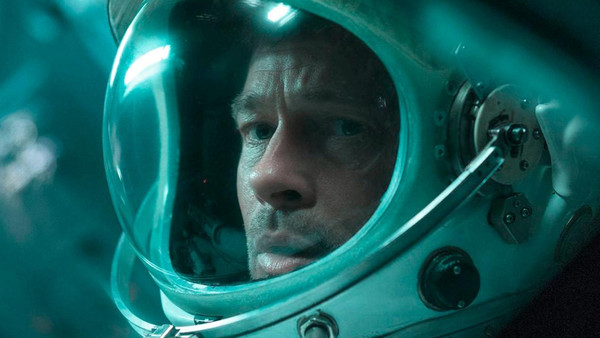Brad and His Dad
This article contains major spoilers for Ad Astra.

Image copyright 20th Century Fox
First things first: I did not like this film. The visuals were pretty cool and the premise was intriguing, but the title is misleading (no one leaves the solar system), the pace was meandering, and there were random moments of violence and action that were tangential at best (filmmakers: “Man, this is starting to drag along. Hey, I know! Let’s throw in a moon rover high-speed chase and shootout. And later we’ll have Brad fight carnivorous floating baboons. And how about a zero-g fistfight that suddenly goes to ten-g’s. Splat!”). Most disappointing of all was the big reveal at the end, which turned out to be nothing more than an equipment malfunction.
I’m a sucker for these sorts of ultra-serious, highly ponderous, lone-dude-out-in-space movies. Yes, I consider 2001: A Space Odyssey to be an unequaled masterpiece, and I also consider Interstellar to be perfumed hogwash. I can forgive hokey science for the sake of drama and visuals (e.g., Sunshine, Europa Report) and I’ll power my way through a boring film if there is a grand reveal at the end (Solaris, 2010: The Year We Make Contact). So I had high hopes for Ad Astra, even going out by myself to see the very first showing at my local theater.
If you haven’t seen it yet (and don’t plan to) and you’re confused by the multitude of trailers with varying tones, here is the gist: Brad Pitt’s dad (Tommy Lee Jones) abandons him and his mom and goes off to space to search for alien signals. Fast forward a few decades: dad is presumed dead, Brad Pitt follows in his space-faring footsteps. Strange things happen on Earth with Neptune as the source, which is where Jones was supposed to have ended up. Pitt, estranged from his wife on Earth, gets sent on a mission to find him and/or stop the disruptive signals. Complications ensue, people die, but eventually Pitt makes his way to the edge of the solar system. He finds Jones alive and still continuing his search, which has been fruitless thus far. He tries to bring Jones back, but Jones tells him to “let me go”, cuts the literal and symbolic cord binding them together, and floats off into the void. A heartbroken Pitt makes his way back to Earth and patches things up with his wife. Moral of the story: we are not alone in the universe, but we don’t have to look to the stars to find who else is out there.
You can see the reason for my frustration: I was expecting a universe-changing discovery or sinister plot or at least some interdimensional weirdness, and I got Brad Pitt going all the way to Neptune to work out his daddy issues. I couldn’t help but feel that I’ve seen this movie before in a dozen different outfits. For all its silliness and sappiness, at least Interstellar actually got cosmic. Ad Astra should have been named Ad Nauseum.
It doesn’t take a psychology degree to see the yearning people feel for their fathers, especially when those fathers abandon them. We know that there is only one Person who will never leave us nor forsake us, but there are plenty of moments when we do feel alone in the universe. We can’t see God or give Him a hug like we can with our earthly fathers. Yet we see time and again how people that we should be able to depend on let us down or drop out of our lives altogether, and we may even discover that their love for us wasn’t even real in the first place. As a result, we fill our lives with temporary substitutes, and we should know better that they won’t satisfy, but we chase after them anyway.
The Bible tells us repeatedly that God is all we need (Phil. 4:19, Matt. 6:33, Psalm 91, Rom. 8:17, et al). This may seem like one of those promises that is easy to read but hard to believe in, but like all of God’s promises, it is absolutely true. Reconciling broken relationships or letting go of past hurts is not the source of our healing; they are the results of our right relationships with God, which must come first. As Brad Pitt found out, finding the father who had abandoned him and who was presumed dead did not bring him peace. The unbelieving world tries to fill the emptiness left by one broken relationship by substituting it with another, but we as believers in Christ know that communing with our Creator is the only relationship that we can truly depend on.







































Mark, thanks for your review, though maybe you should have mentioned you have SPOILERS for the ending. (Oh, wait, now I see you did! My brain saw that as a picture caption and ignored it…)
I’m interested in minutae like a zero g fist-fight, if done well, and don’t mind great visuals, so I might see this film myself someday. But based on what you said, I’m not going to pay a theater ticket price for it, in spite of the visuals.
Sorry though you had to pay the full price to find out you didn’t like the movie…
It says there are major spoilers at the very top of the article?
Aha–there’s me ignoring bold titles over pictures again. My brain assumed the line was about the picture and moved on to the “interesting” stuff in the text–which doesn’t mention spoilers…my bad. (I went back and edited my original comment.)
We were similarly disappointed watching Alita last night, though we didn’t get any attempts at any kind of depth out of it like you did with this one.